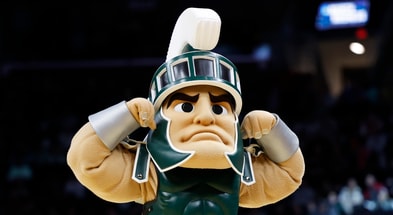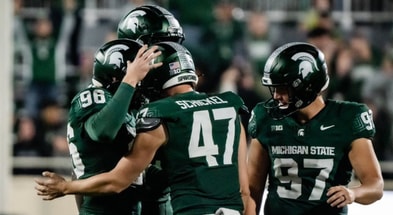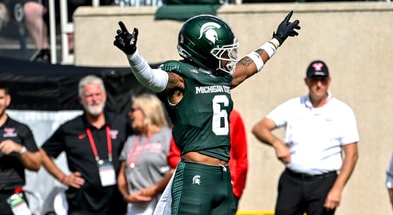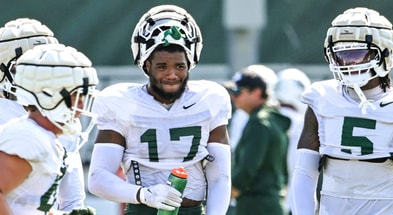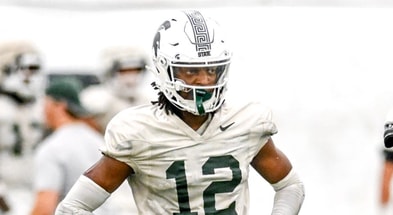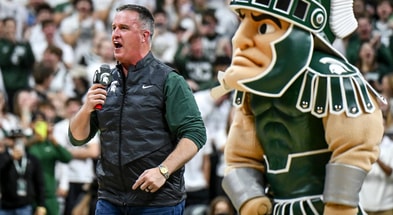Michigan State schedules Western Michigan for '28 and '31: What it means and what's next
East Lansing, Mich. – Michigan State announced on Tuesday the addition of Western Michigan as a non-conference opponent for the 2028 and 2031 football seasons.
Both games will be played at Spartan Stadium.
Michigan State will play host to the Broncos on Sept. 2, 2028 and Aug. 30, 2031 with both games expected to be season-openers for the Spartans.
Other opponents for the 2028 and 2031 seasons have yet to be named.
The two schools are also scheduled to play on Aug. 30, 2025 at Spartan Stadium in an agreement that was released previously.
Including those three games against Western Michigan, Michigan State is scheduled to play Mid-American Conference opponents
eight times in the next nine seasons. The others are:
vs. Central Michigan in 2023.
vs. Toledo and Eastern Michigan in 2026.
vs. Central Michigan in 2027.
vs. Central Michigan in 2030.
The game against Toledo in 2026 is a make-up for the game that was supposed to have been played in 2020 but was cancelled due to COVID.
FUTURE SCHEDULING ISSUES FOR MICHIGAN STATE
Michigan State traditionally aims to play one Power Five, non-conference opponent each year. Western Michigan is not in that category.
The Spartans will play host to Washington, a Power Five school, in 2023. Michigan State has a two-game, home-and-home series scheduled with Boston College for 2024 and 2025.
The Spartans have a home-and-home series scheduled with Oregon for 2029 and 2030.
Michigan State is scheduled to play at Brigham Young in 2032. That game was originally scheduled to be played in 2020 but was canceled due to COVID and rescheduled for 2032. The first of the home-and-home series with BYU was played in 2016, with BYU winning 31-14.
In 2020, the Spartans were scheduled to play host to Miami. That game was canceled due to COVID. Michigan State played at Miami in 2021, but a return trip by the Hurricanes to Spartan Stadium is not in the works. A Michigan State official confirmed with SpartanMag that the original contract with Miami is “done.”
In 2020, the Spartans were scheduled to play BYU and Miami. Facing two Power Five-level programs in the same year was viewed by some observers at the time as an unnecessarily difficult scheduling error for Spartan football. Rescheduling a home game with Miami could result in the same undesirable predicament of having two Power Five opponents on the schedule in the same year on a future schedule.
Michigan State is likely seeking a Power Five, non-conference opponent for the ’26, ’27, ’28 and ’31 seasons. A pair of home-and-home agreements would be the simplest and most common way of filling out the schedule in those years.
Notre Dame had been listed as an expected opponent for the ’26 and ’27 seasons, but that home-and-home deal has not been listed as an official contract by either school for several years.
Top 10
- 1Breaking
Heisman Trophy
Best player in CFB crowned
- 2Trending
Heisman Voting
Final vote totals released
- 3
Michigan Athletic Dept.
Full investigation commissioned
- 4Hot
Kenny Dillingham
Nearing extension with ASU
- 5
Michigan Coach Search
Three names to watch
Get the Daily On3 Newsletter in your inbox every morning
By clicking "Subscribe to Newsletter", I agree to On3's Privacy Notice, Terms, and use of my personal information described therein.
A pair of new home-and-home contracts with two Power Five opponents for ’26, ’27, ’28 and ’31 would balance out Michigan State’s non-conference scheduling through 2031.
However, things get sticky for Michigan State after 2031 in its traditional goal of playing only one Power Five non-conference opponent per year. The agreement to play at BYU in 2032 looms as a hurdle.
If Michigan State goes through with that game at BYU, the Spartans will have trouble finding a Power Five opponent to play a one-and-done in East Lansing in a season after 2032. Finding a dance partner for a one-off at Spartan Stadium at some point after 2032 would balance out the schedule and finances in subsequent years, but Power Five opponents rarely agree to one-and-done contracts. Home-and-homes are the norm for Power Five schools.
Another solution for Michigan State would be to play a single season after 2032 without a Power Five, non-conference opponent on the schedule, similar to the University of Michigan’s current scheduling. But the Big Ten and its TV partners would likely balk at that route for Big Ten teams in the future, and Spartan fans likely wouldn’t like it, either. Michigan has faced ridicule for this practice.
If Michigan State is able to get out of its 2032 contract with BYU, that would solve the imbalance, but it could come at a price. Michigan State is scheduled to receive $350,000 for playing at BYU in 2032, the same amount that the university paid BYU for its visit in 2016.
The cost for buying out that contract would likely approach or exceed seven figures, but could open the door for a balanced schedule going forward. The costs of buying out that contract could be offset with a home game against a Power Five opponent in 2032 as the first leg of a home-and-home.
Bringing Miami in as a home game in 2032, replacing a buyout trip to BYU, could make sense if the parties were interested. But that would create a scheduling imbalance for Miami in the years ahead, which the Hurricanes do not want.
Meanwhile, Big Ten non-conference and conference scheduling is a bit in limbo for the years ahead. Scheduling strategies and concepts, plus the possibility of further Big Ten expansion, will be key discussion points with new Big Ten commissioner Tony Petitti having been hired earlier this month. With USC and UCLA joining the schedule, and the possibility of more Pac-12 teams coming to the Big Ten, the scheduling of Power Five non-conference opponents for Big Ten teams in the future could become a rarity.

